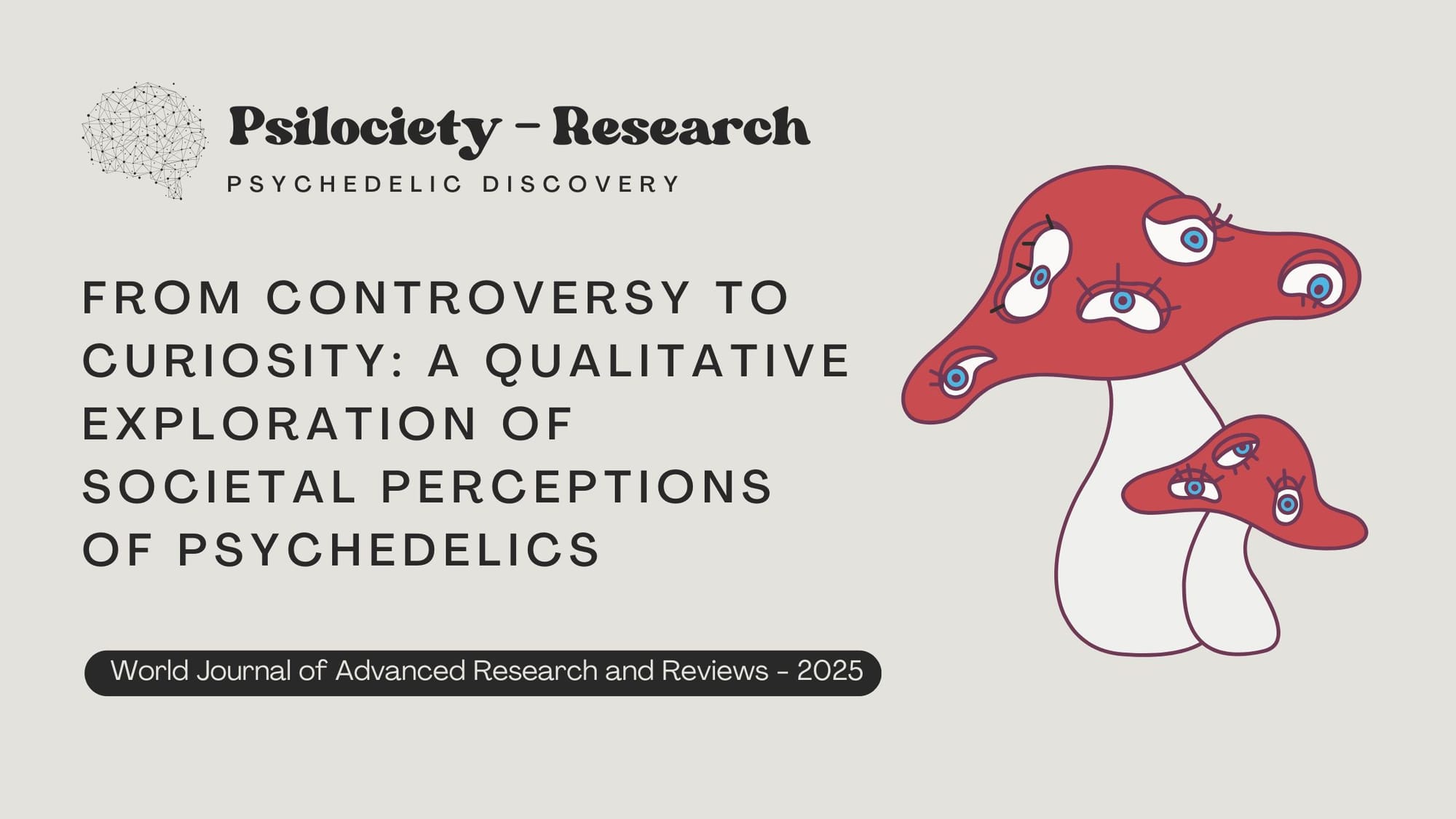From Controversy to Curiosity: A Qualitative Exploration of Societal Perceptions of Psychedelics
A qualitative study exploring societal perceptions of psychedelics, highlighting increasing curiosity and persistent concerns about safety and stigma.

Title & Introduction
- Paper Title: From Controversy to Curiosity: A Qualitative Exploration of Societal Perceptions of Psychedelics
- Published In: World Journal of Advanced Research and Reviews
- Publish date: March 05, 2025
- Authors: Kerem Kemal Soylemez, Emma Marie de Boo, Coral Yaron Shoklander, Oliver Edward Lawrence, Joanne Lusher
- Objective: To investigate societal perceptions and beliefs about psychedelic substances, particularly in the context of mental health treatment.
- Importance: While research increasingly supports psychedelics for mental health therapy, societal stigma remains a major barrier to their integration. This study explores how public perception is evolving and what factors contribute to stigma and acceptance.
Summary & Takeaways
Key Takeaway: Public perceptions of psychedelics are shifting from controversy to curiosity, with increasing awareness of their therapeutic potential. However, fears surrounding loss of control, safety, and stigma remain prevalent, particularly among older generations and in culturally conservative regions.
Practical Application: Understanding societal beliefs about psychedelics can help shape public education campaigns and policy changes to reduce stigma and encourage informed discussions around their medical use.
Key Background Information
- Context: Psychedelics have historically been stigmatized, particularly due to associations with countercultural movements and criminalization. However, contemporary research highlights their potential for treating mental health disorders, warranting a reevaluation of public attitudes.
- Hypothesis: Public perceptions of psychedelics are influenced by generational and cultural factors, with younger generations and those from progressive regions showing greater acceptance.
Methodology
- Study Design: Qualitative study using semi-structured interviews and thematic analysis.
- Participants: Eight adults with no prior experience with psychedelics, recruited via snowball and convenience sampling.
- Intervention/Exposure: Participants were interviewed about their perceptions and beliefs regarding psychedelics.
- Controls: Not applicable (qualitative study without control groups).
- Duration: Data collection involved one-time, 45-minute online interviews with each participant.
Key Findings
Primary Outcomes:
- Four key themes emerged from the analysis:
- Imbalance within Control Dynamics: Participants expressed concerns about losing control during a psychedelic experience and emphasized the need for supervised administration.
- Therapeutic Efficacy: Many recognized the mental health benefits of psychedelics, particularly for treatment-resistant depression and anxiety.
- Across Generations and Borders: Older participants and those from more conservative cultures were more resistant to psychedelic use, while younger individuals displayed greater openness.
- Growing Awareness: Increasing scientific research and media coverage are helping shift perceptions, although concerns about safety and regulation persist.
Secondary Outcomes:
- Psychedelics were viewed more favorably when framed within a medical or therapeutic context rather than recreational use.
- Cultural background significantly influenced perceptions, with participants from more liberal regions showing greater acceptance.
- Concerns remained regarding potential misuse, lack of regulation, and the role of pharmaceutical companies in psychedelic medicine.
Interpretation & Implications
- Conclusion: While stigma around psychedelics persists, public attitudes are shifting as awareness of their medical benefits grows. Concerns about control, safety, and cultural acceptance remain key barriers to widespread integration.
- Implications: Public education and policy reforms are needed to reduce stigma and support the responsible use of psychedelics in mental health treatment.
- Limitations: Small sample size and focus on individuals with no prior psychedelic experience may limit generalizability. Further research is needed to explore perspectives from diverse populations.
Researchers & Publication
- Researchers: Kerem Kemal Soylemez, Emma Marie de Boo, Coral Yaron Shoklander, Oliver Edward Lawrence, Joanne Lusher
- Publication Name: World Journal of Advanced Research and Reviews
- Study URL: https://doi.org/10.30574/wjarr.2025.25.3.0720

